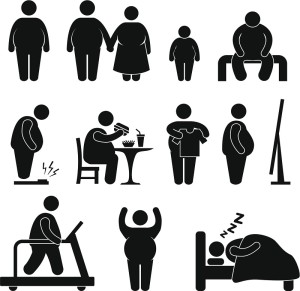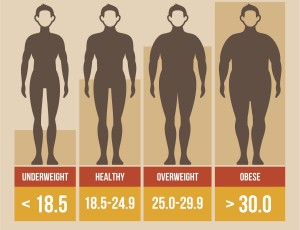A few extra kilos aren’t so good for you after all
It’s a myth that people who weigh a bit more than average live longest. A recent analysis of 30 million people shows that those who had a normal weight had the lowest risk of premature death.
BMI:Healthy non-smokers are at the lowest risk of premature death if they have a BMI between 20 and 24. It is a myth that a few extra kilos are good for you.
A research report showing that people with a body mass index (BMI), which corresponds to being overweight (BMI 25-30) live longer than people with a normal weight (BMI 18.5-25) was a sensation in both Norwegian and international media a few years ago. The study also showed that people with a BMI that means they are moderately obese (30-35) were at no higher risk of early death than people with a normal body weight, and that this risk only increases for people who are extremely obese (with a BMI greater than 35).
Weeding out sources of error
A research team consisting mainly of researchers from NTNU in Trondheim has taken a second look at the matter, picking out the weaknesses that the previous analysis had. The analysis involved over 30 million people, and they’ve come to a quite different result.
If everyone who has smoked at some point in their life is removed from the analysis, the risk of early death is suddenly lowest at a BMI of 23-24.
When the researchers removed everyone who had a chronic illnesses at the time that the BMI data was collected, they found the lowest risk of premature death was at a BMI of 22-23. And when they only included studies with a long follow-up, only healthy non-smokers with a BMI between 20 and 22 don’t have to worry about dying prematurely as a result of their extra kilos.
Smokers and people with chronic illness have a low BMI

On average, smokers and chronically ill people have a lower BMI. This can cause misleading statistics if you don’t take it into consideration. Photo: Thinkstock
“Smokers are at a much higher risk of chronic illness and premature death due to over 20 different diseases, but also generally have a lower BMI than non-smokers. Because of this correlation between smoking and both low weight and premature death, we have to exclude smokers from studies like this to get accurate results,” says Dagfinn Aune, who was the head author of an article recently published as the lead article in the prestigious British Medical Journal.
Chronic illness can also cause sudden weight loss. In addition, people who are chronically ill are at a much higher risk of premature death. The results from studies that were over a shorter period of time are generally more affected by chronically ill people who have lost weight, but have no diagnosis.
What is BMI?
Body Mass Index (BMI) is a way to measure the relationship between height and weight, and is used as an international indicator of obesity. You can calculate your BMI using the relation (weight[kg])/(height[m])². You can also use this online BMI calculator.
Note: The limits for what determines a child's healthy weight are different than for adults and are dependent on age.
Source: CERG
“Both smoking and chronic disease can therefore contribute to the overestimation of what optimal BMI is, because these conditions superpose with benefits on the low end of the BMI scale. This is difficult to adjust for statistically. The previous meta-analysis hadn’t done this well enough, but this time we’ve done a better job,” Aune explains.
30 million participants
Aune and his research colleagues included 230 studies that looked at the relationship between BMI and death due to varying causes. All told, these studies has over 30 000 000 participants, where 3 700 000 died during the follow-up of the study. This is more than ten times as many participants and deaths as the previous meta-analysis, which only included studies where the participants were categorised only by their BMI.

The studies examined by the researchers involved more than 30 million people. Illustration: Thinkstock
“Another shortcoming of the previous analysis is that many of the larger studies used more refined BMI-categories to define the relationship between BMI and mortality better. These studies had therefore been excluded. In addition, there has been a number of new studies about this since the previous analysis was published,” says Aune.
The previous analysis showed that a BMI of 25 meant lowest risk of death, while both higher and lower BMIs lead to increasing risk of mortality.
People who are overweight according to the BMI-scale are at no higher risk of premature death than someone with a normal BMI of 23, but anyone with a BMI indicating obesity is at a significantly higher risk.
The analysis of non-smokers comprised of 10 000 000 participants and 740 000 deaths, and showed that both overweight and obesity leaded to a significant risk of premature death.
In the analysis of healthy non-smokers in studies with a long follow-up period, a person with a BMI of 20 was at no higher risk of premature death than a BMI of 23, but those with a BMI at the higher end of the normal range, as well as people who are overweight and obese are all at a higher risk of premature death.
- You might also like: Big gut? You could be increasing your cancer risk.
Over half of Norwegian adults are overweight, and one in five has a BMI that means they are obese. Being overweight and obese are linked to a number of conditions, including cardiovascular disease and a number of forms of cancer.
“Our finds show that a BMI that corresponds to being overweight or obese can mean an increased risk of premature death. But the BMI scale doesn’t differentiate between muscle mass and fat, so it isn’t a perfect indicator of whether a person is overweight or obese. However, in most cases, there is a significant correlation between BMI and body fat percentage,” Aune says.
He points out that a person’s BMI is a worse indicator of body fat percentage as that person gets older, because the amount of illness and weight loss due to illness increase with age. In addition, we lose muscle mass as we age, so a low BMI for an older person may just mean low muscle mass. Adding waist measurement and a waist-hip ratio can help give a better idea of fat distribution.






